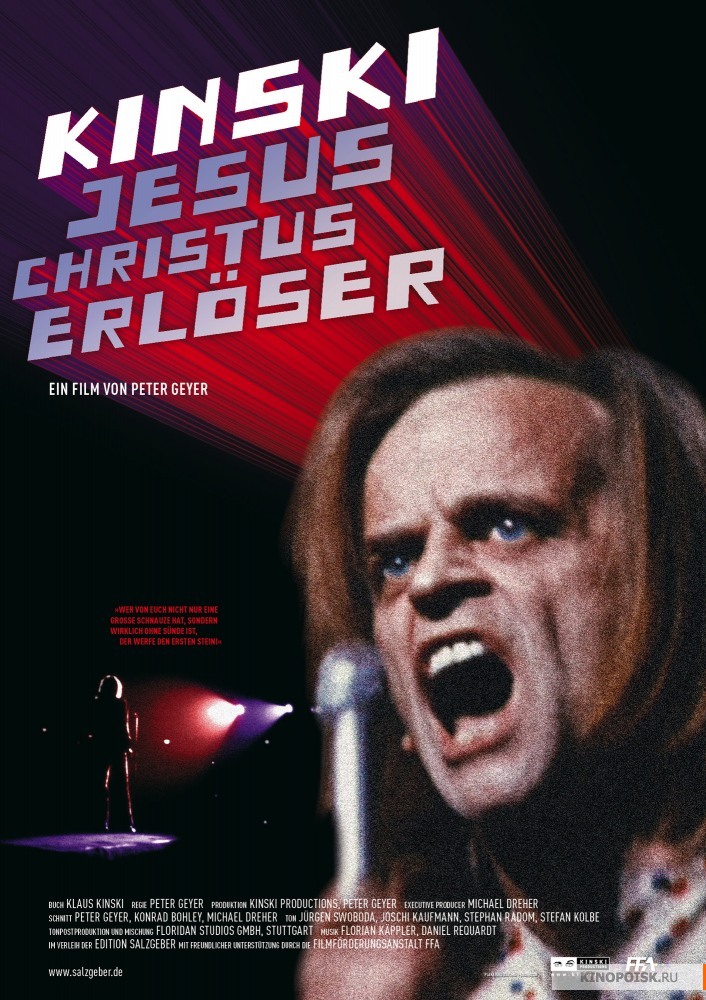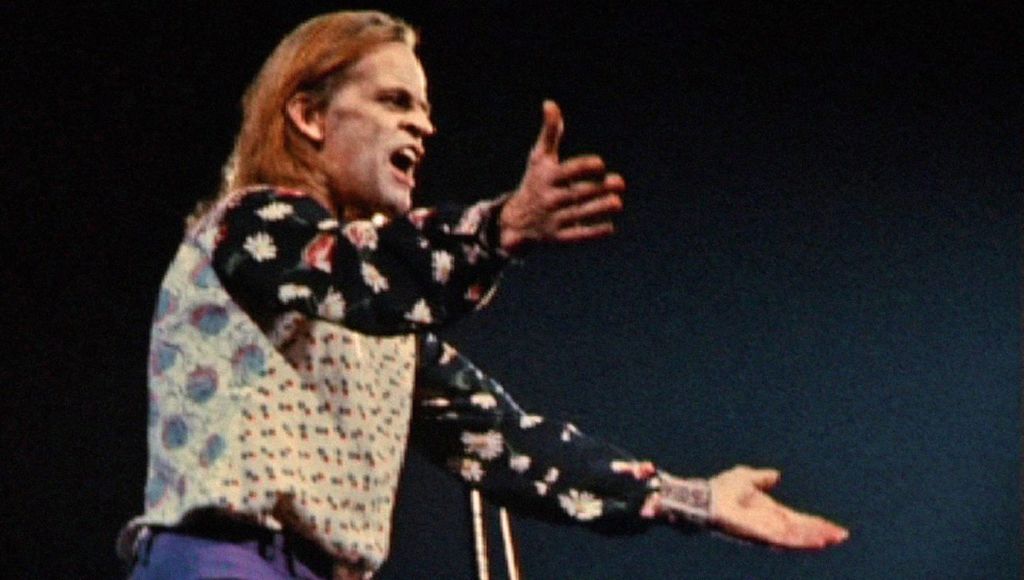Dir: Peter Geyer
Star: Klaus Kinski
“I have come to tell mankind´s most exciting story: The Story of Jesus Christ. l’m not talking about that Jesus with jaundiced skin who was made the biggest whore ever by an insane human society that perversely drags his cadaver around on infamous crosses. l´m talking about that adventurer, the freest and most modern of all men, who preferred to be massacred than to rot alive with all the others. l´m talking about a man who is just the way we all want to be. You and me.”
 Translating as Jesus Christ, Savior, it’s subtitled An evening with Klaus Kinski, and that is perhaps more a threat than a promise. For this is an 84-minute theatrical car-crash of a live performance from 1971 – but, really, what else would you expect when someone like Kinski sets himself up, by creating an event where he’ll provide his view of Jesus Christ for two hours? The tone is set immediately, as Klaus starts off by describing Christ in the style of a police report, and after saying “Alleged profession: worker,” someone in the crowd shouts out, “But you have never done any work!” It’s not long before things escalate. “I want my 10 Marks back!” yells another spectator, and the flood-gates are open. “Are you here to put on a show or just to amuse the people?” “He is just wanking around!” “You’re at a loss, aren’t you?
Translating as Jesus Christ, Savior, it’s subtitled An evening with Klaus Kinski, and that is perhaps more a threat than a promise. For this is an 84-minute theatrical car-crash of a live performance from 1971 – but, really, what else would you expect when someone like Kinski sets himself up, by creating an event where he’ll provide his view of Jesus Christ for two hours? The tone is set immediately, as Klaus starts off by describing Christ in the style of a police report, and after saying “Alleged profession: worker,” someone in the crowd shouts out, “But you have never done any work!” It’s not long before things escalate. “I want my 10 Marks back!” yells another spectator, and the flood-gates are open. “Are you here to put on a show or just to amuse the people?” “He is just wanking around!” “You’re at a loss, aren’t you?
You will not be surprised to hear, Kinski does not handle hecklers well. yelling back “Just shut the hell up, so you can hear what I have to say!” and inviting another to “come up here, you with your big mouth.” The audience member is apparently rather braver than I would be, and actually does go on stage, arguing that if people contradicted Christ, “He tried to convince them, he didn’t say, ‘Shut up.'” To which Kinski replies, “No, he took a whip and bashed them in the face! That´s what he did! You stupid pig! And that can happen to you, too!” Yeah, when Kinski later proclaims, “I am not your Superstar,” he isn’t kidding. Klaus Kinski, like the SubGenius Foundation, is with Jesus, the fighting Jesus, not some long-haired mushmouth.
It isn’t long before Kinski storms off the stage, after delivering this parting shot: “There are two possibilities! Either those of you who aren’t part of that riff-raff throw the others out! Or else you spent your money for nothing!” He returns, and starts from the beginning again. He does get further, describing his notion of Christ as someone who was with the outsiders and the hurt, not establishment groups like the church or the Army. “Woe to you who are rich,” Kinski quotes Jesus as saying, “Every inmate and every prostitute is better than you.” But this doesn’t sit well with a crowd who paid Klaus a fair bit of money (probably about the equivalent of twenty bucks each, in today’s money) and the heckling starts up again. Not lost on the crowd is the irony, given Kinski’s attitude, in hearing him preach, “Do unto others as you should have them do unto you,” and “Love your enemies.”
Another audience member takes the stage at this point, and politely inquires, “Mr. Kinski, can I say something?” Klaus gives him that look – y’know, the one delivered to the monkey at the end of Aguirre, which causes the simian to shit itself – and instructs security to kick him off. The man persists – again, showing more courage (or, possibly, stupidity) than I would – but only succeeds in driving Kinski from the stage again, this time declaring, “If even one person remains who wants to hear this, he’ll have to wait until the fucking riff-raff has left!” While he’s out, a discussion ensues, with Klaus being accused of “fascist methods”, but the counterpoint is made that this is a performance, and “people have no right just to come up on stage.”
Klaus takes the stage for a third time, after pleas are made for people “to stop interrupting and provoking Mr. Kinski.” You can guess how well this works, and the non-playful banter continues, as Kinski tells the story of Christ berating a priest for eating without being hungry. “Speak today´s language and not one of 2,000 years ago!” yells a heckler, followed by “We aren’t little kids anymore. We’re enlightened adults!” Another comments, “It’s just like an Edgar Wallace movie or a spaghetti Western,” a pointed reference to Kinski’s large body of work for hire. Klaus’s long pauses also draw derision, with cat-calls of “Forget your lines again?” and an almost Pythonesque, “Get on with it!”, the latter prompting the performer to snarl back venomously, “You’re one of those who nailed him to the cross!”
A subsequent further reference to his movies, “The crime movies are better” also gets the hoped-for (and not very Christian) reaction, “I didn’t make those crime movies for a moron like you, idiot!” That marks the effective end to the meaningful portion of the evening’s entertainment, Kinski flouncing off stage for a third and final time, as chants of “Kinski is a fascist!” are heard [does Godwin’s Law apply in Germany?], an incensed Klaus declaring, “At least they let Jesus speak before they nailed him up.” While Kinski declares the performance over, a couple of hundred hardy souls stick around, down at the front, and are eventually treated to a Kinski Unplugged performance of the text, though even this has its road-bumps: “Can’t you just shut up! lf you can’t understand that, then let someone pound it into your brain with a hammer!” Finally, at 2am, the night concludes.
It’s truly one of those events that must have been utterly memorable to experience in person, with a real sense of danger, and no way of knowing what would happen next. Kinski, who did a number of recordings of great works and spoken-word performances, in his early career, certainly has the gravitas and stage presence to pull it off, but the problem is the subject matter. It seems too obvious that he is drawing parallels between himself and Christ, which does not go down well with the irreligious and/or atheist crowd members. Combine that with Kinski’s notoriously short fuse, and the results are almost inevitable. He certainly makes some good points about Christ, but as one of the crowd puts it: “Let me make this quote: ‘You will know me by the deeds I do.’ That’s decisive.” And indeed it is: the chasm between Christ’s words and Kinski’s actions are undeniable, and it’s clear why the proposed world tour never happened.
This was pieced together by Geyer from fragmented footage taken on the night, decades after the event and the camerawork as a result is occasionally ropey. But the power and intensity of Kinski is undeniable, and you can understand what his intended vision of the event was. However, as so often, failure is more interesting than success, and one suspects an uninterrupted performance, in front of the appropriate reverential crowd dreamed of by Klaus, would have given us a good deal less of a glimpse into the true personality of its creator. Below, is a section of the show.
